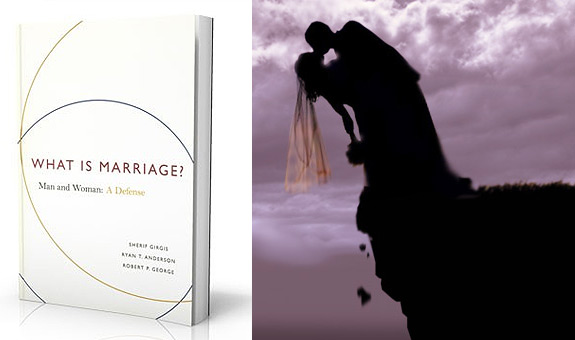
 1. Is What Is Marriage? Man and Woman: A Defense a must read? Yes. This is the primer for common sense arguments supporting traditional marriage.
1. Is What Is Marriage? Man and Woman: A Defense a must read? Yes. This is the primer for common sense arguments supporting traditional marriage.
2. For whom is it written? It is written by very intelligent men of good will primarily for other intelligent men of good will who appreciate a well-honed argument. The philosophical arguments slice and dice, so some background in philosophy is helpful. In keeping track of points as they unfold paragraph by paragraph, one needs a working short-term memory. I know this firsthand.
3. Because the U.S. Supreme Court has struck down the legal standing of Prop 8 proponents and dissolved that half of DOMA having to do with the federal definition of marriage, is this book moot? In the short term, probably. In the long-term, definitely not. The arguments used in the book will never age, and the kind of sociological/psychological data the authors had access to will only get better.
4. Are these the only arguments that work? No. Can one use theological arguments to good advantage? Good question. The answer, of course, depends on the audience.
Up front, I am for all sound arguments for traditional marriage, from wherever and at whatever level. My classes and audiences are mostly Catholic, so I go straight to the thought of John Paul II without using filters of any kind—Thomistic, Marian, Westian, etc. Save for Michael Waldstein’s excellent introduction to Man and Woman He Created Them, the class material is primary stuff.
For my students and participants there is, inevitably, the weeping and gnashing of teeth, and the rending of garments. But those who persevere know, without a doubt, why there is no such thing as “same-sex marriage.” They learn that there is an ontological foundation to the gift of self that comes directly from the internal life of the Trinity. That foundation is complementary, and inherently love-giving and life-giving.
That said, a class of adults and I have just completed a 6-hour course using only the text, What Is Marriage? I wanted them to know, up close, what was available and valuable at the natural law level. The majority of their conversations about the marriage controversy will be in the work place where common sense, not theology, is more apropos. (See also William B. May’s Getting the Marriage Conversation Right: A Guide for Effective Dialogue.)
One of the precepts of teaching is sheer: do not waste the student’s time. I pick works that I know can make a difference—game-changers. What Is Marriage? is one of those works; it will not fade away, like an old soldier. On the contrary (and with apologies for slipping back into Marine-speak), it will gain stature as we go back and forth across no-man’s land in the battles to come, trusting that someday we shall retake and hold onto the real meaning of marriage—our modern day Belleau Wood.
• Related on CWR: “What Price Marriage?”: John S. Hamlon’s review of What Is Marriage? (June 26, 2013)
If you value the news and views Catholic World Report provides, please consider donating to support our efforts. Your contribution will help us continue to make CWR available to all readers worldwide for free, without a subscription. Thank you for your generosity!
Click here for more information on donating to CWR. Click here to sign up for our newsletter.

